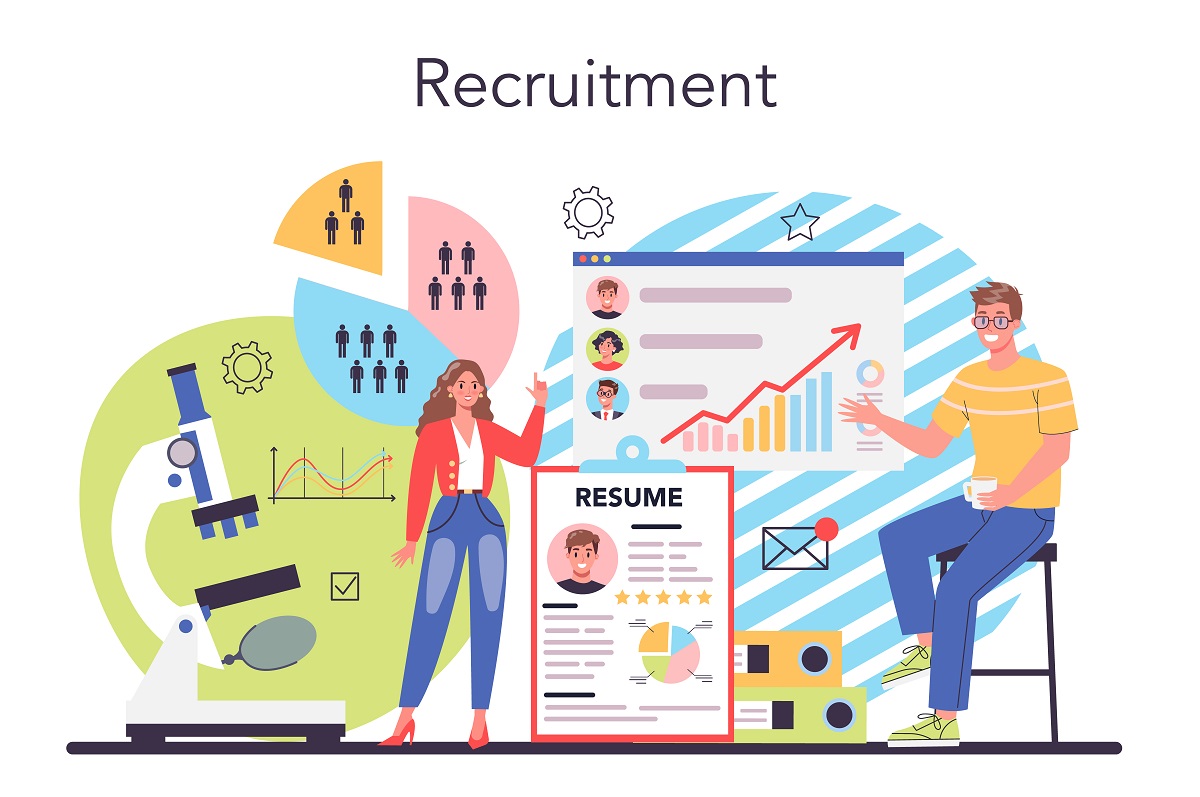Remote Interviews , Remote Staffing
Do’s and Don’ts for remote interviews for software developers
Dressing up for an interview and traveling with a folder with your resume and accolades...
The pandemic has pushed “The Great Resignation”. The great resignation phenomenon has disrupted the talent market, and this disrupted talent market warrants 10x effort to source the same talent which was easily and cheaply available prior to 2020. The work-from-anywhere phenomenon has made the same talent accessible by companies from across the globe which was earlier available for only local jobs. Offer-to-Join ratio have plummeted to all time low. Even the multinational IT companies are feeling the pinch with this ratio hitting as low as 10:5.
Recruiters are working day in and day out to have a healthy pipeline per position. If they don’t adopt automation, their hiring cycle is going to be prolongated, which means slower results, and lost billable opportunities for the organizations.

Recruitment is an ever-evolving process, and if you are not adapting to the changing trends, you might be left behind. Over the last few years, with advancements in technology and artificial intelligence, there has been a massive change in the way companies hire.
Organizations are now getting inundated with thousands of resumes and applications daily. In fact, according to Glassdoor, some companies get up to 250 applications per job opening.
In addition to the challenges that this rapid influx of applications causes, hiring managers are also facing more challenges than ever before when it comes to finding qualified candidates. Fortunately, there are ways to improve your recruitment process with automation.
Automation is a booming concept in almost every industry and every sphere of life. Automation is making things easier for people to do their jobs more efficiently and quickly. The same can be said about recruitment automation.
One of the biggest trends that have taken over the hiring industry is automation. According to LinkedIn, 80 percent companies are seeing improved productivity with recruitment automation. Hiring a new employee requires careful consideration, time, and money. Many companies are turning to hire offshore development teams and remote developers to save time and cost, but that comes with challenges of its own.
So, what is recruitment automation? We will discuss this and the benefits of recruitment automation for your business:
 Recruitment automation refers to using software or tools to automate manual tasks involved in the recruitment process. The software generally consists of an applicant tracking system (ATS) and a chatbot, which allows applicants to apply for open positions and interview for them without talking to a human recruiter. Automation is even more important for companies in the post-COVID environment.
Recruitment automation refers to using software or tools to automate manual tasks involved in the recruitment process. The software generally consists of an applicant tracking system (ATS) and a chatbot, which allows applicants to apply for open positions and interview for them without talking to a human recruiter. Automation is even more important for companies in the post-COVID environment.
With the pandemic pushing businesses toward remote work, many companies have been forced to take a new look at their hiring strategies. In addition, many companies are looking to hire contract workers as part of this shift towards remote work. Automation can help with both of these initiatives.
It can help companies save time and money by automating the initial stages of hiring such as job posting, screening and shortlisting candidates, organizing and scheduling interviews, tracking candidates’ application status. sending interview reminders, etc.
There should be at least 100 ATS vendors, making the industry competitive and crowded. From 2019 through 2023, IDC predicts that operating income from talent management technology and services, such as applicant tracking systems and recruiting software, would expand at an average yearly growth rate of 5.2 percent.
What you can do with recruitment automation tools from in-house developers or when you hire offshore development team, include the following:

Sourcing
First of all, the biggest advantage you can take from an Application tracking system is about one button push to syndicate your job to all the popular platforms, provided they are integrated with your ATS. Some ATS lets you do free syndication across Indeed, Glassdoor, Google Jobs, WayUp, JobRapido, ZipRecruiter etc. You can, at the same time, manage sponsored job posts centrally too.
Round Zero Screening

Imagine, if there are 100+ candidates each day applying for the role of an Executive Assistant or a UI/UX designer, it will be nightmare to screen the candidates manually. At the best, one can skim through resumes and rule out the irrelevant ones based on the keywords, but what about the remaining ones? Do hiring managers have time to meet all of them? Are all of them relevant?
Here comes the automated text-video questionnaire, which is triggered as soon as one applies for that position and based on candidates, video and text responses, one can decide whether further in-person rounds are needed or not.
Here is an example of Round Zero automated questionnaire:
Technical Screening
There are several online technical assessment tools available in the market such as HackerRank, TestGorilla, Mettl etc. They run a few pre-defined sets of questions in a monitored environment, and they help in decoding candidates’ coding aptitude, analyzing candidates’ understanding of core technical concepts, and gauging candidates coding proficiency in general programming languages. These tools help screen out more than 60% of the candidates with their near-true result on candidates and save the panelists’ time.
Candidate Management and Scheduling
ATS or your custom HRMS cum ATS, as the single point tool of collaboration between recruiters, candidates, and the hiring managers and panelists, makes life for everyone easy and makes the system real-time and single point of truth for all the stakeholders in the organization.
Your candidates are shown in the proper pipeline stage of the hiring, and you can schedule interviews, record scorecards, internal notes everything from the same system. The ‘ad-hoc-ness’ of the recruitment is replaced with a complete structure.
Recruitment automation doesn’t just help candidates and recruiters; it benefits companies too. Using an automated program eliminates many of the issues that come with traditional recruiting methods. Time-consuming tasks are replaced by automated programs that are more efficient, making the overall process faster and easier for everyone involved.
Additionally, the program allows them to save money on resources like labor costs or human error correction when compared to other traditional recruiting methods.
Here are some of the benefits of using recruitment automation:
Reduces the task of documentation
The first and foremost thing that comes to mind when thinking about automation is the tedious task of documentation. With a huge intake of resumes, a human can’t sift through all of them, look for keywords, and sort the resumes in an order of preference. Automation eliminates this factor by sorting the resumes according to their relevance to the job description. This way the recruitment team can focus on more important tasks like interviewing candidates.
Helps Companies Streamline Their Processes
Automation helps employers automate and streamline their hiring processes so they can easily weed out unqualified candidates. This enables hiring managers to focus on the most qualified candidates—and ultimately hire better employees.
Gives Employers More Time to Focus on What Matters Most

Hiring managers are busy people. They have many responsibilities from other parts of their jobs that they need to attend to in addition to recruiting new hires, and they’re often pulled in many different directions at once. Automation helps free up time so that recruiters can spend more time focusing on what matters most.
The bigger the company, the more likely it is to require a skilled workforce that has a specific skill-set and experience matching the job requirements. So, how do they get over this hurdle? By automating their recruitment process to cut down on time and resources required for hiring candidates for different roles in their respective departments. Companies like Amazon, Google, and Apple are doing this very successfully and have been able to get over all kinds of hurdles related to the hiring process.
Helps to attract better talent
To attract the right talent, companies need to invest in an easy-to-use recruitment process that makes it easy for candidates to find information about the company, apply to open positions and monitor the status of their applications. An automated recruitment process helps you do just that. By reducing the amount of manual work involved in these processes, companies can focus on bettering their candidate experience (and thus attracting better talent).
Helps to hire faster and better
An automated recruitment process also helps you hire faster than your competitors by saving time on mundane tasks like sending out emails and reminders. It also improves your hiring efficiency by making it easier for you to check candidate resumes against job requirements and compare different candidates side-by-side. With an automated system, you can apply filters based on specific requirements and find the best candidates quickly and easily.
Saves Money on Advertisements
The most obvious benefit of recruitment automation is the amount of money it can save a company by eliminating the need to place costly ads across multiple platforms. Not only that, but hiring agencies are also expensive and inefficient in finding the right candidate for a job. Instead, companies can look to recruiters who specialize in social media to find candidates that are already looking for work.
An automated recruitment system will also be able to track how many people have applied for a job and what stage they are in the process. This way, managers can easily see if a bottleneck or issue is preventing them from moving forward with certain candidates or if they need additional information before making a final decision.
Saves time
Automating some parts of the recruitment process will save a lot of time and effort by eliminating some of the more tedious tasks that recruiters face. It can free up time for recruiters to focus on interviewing candidates and making real connections with them, as well as automating other tasks such as scheduling interviews and sending out rejection letters.
This gives companies a competitive advantage when it comes to hiring, as they can find qualified candidates more quickly than their competitors.
Eliminates biases
One more great thing about automation: it can help make sure that everyone is treated fairly. Machine learning algorithms don’t care about race, gender, or age—they’re only interested in skills and experience (which helps eliminate unconscious bias).
Because robots don’t have emotions or personal preferences, they can eliminate bias from the hiring process by screening candidates based solely on the criteria you set—not on gender, age, race, or any other factor that might affect a human recruiter’s decision.
Easily keeps track of candidates
Another advantage offered by Automation is that it can help you easily keep track of your candidates. It can also help you schedule interviews with a candidate in a matter of seconds. The best part is that you will never have to worry about forgetting a candidate’s interview date because automated emails are sent out at regular intervals.
Moreover, it also keeps track of each candidate’s progress throughout the recruitment process, so you don’t have to worry about missing out on someone who is almost ready for hire. Last but not least, it helps you keep track of all your employees’ data from one place and allows you to share information with other members of your team easily so they too can access all the necessary data without any hassle.
While it’s seemingly impossible to automate the entire process of finding and hiring the right person for the job, there are some tools and techniques that can be employed to make things less manual and more efficient. So, here are some of them.
Recruitment automated Software Tools
There are many software tools and applications currently available in the market that can automate various tasks involved in recruitment. These tools can be easily integrated with other software tools like ERP, Project management tools, etc.
Some of them are:
1. Jobvite
Jobvite is an applicant tracking system (ATS) that helps companies in finding and hire candidates through social media sites like Facebook, LinkedIn, Twitter, and Google+ by posting job ads on these sites. It provides features such as automated sourcing through Jobvite Source which searches resumes from numerous sources including job boards. The tool also allows recruiters to send messages via social media sites as well as post jobs on their company’s career page.
2. Workable
Workable is a cloud-based ATS that helps in creating job ads and posting them on different job boards like Indeed, LinkedIn, and Glassdoor; it also offers a tool that lets users find matching resumes from Indeed’s resume database. The tool not only allows you to hire people from your own country but also from other countries by posting jobs internationally on job boards.
Workable is one of the most popular recruitment software tools available today. It provides features such as:
• Integration with Gmail, Outlook, LinkedIn
• Collaborate with colleagues through activity stream and whiteboard feature
• Reporting on all activities such as time to hire and source of hire
• Email templates for different stages of the interview process
3. Recruitee
It is a tool that is used to manage hiring workflow, source candidates and track their progress via the interview stage using its user-friendly interface.
4. Breezy HR
With this tool, you can send automatic follow-up emails to the candidates, rank them according to their skillset and availability, and schedule interviews with just a single click.
5. Lever
It provides a single workspace platform for candidate sourcing, hiring, and onboarding processes. This applicant tracking system organizes your data in one place so you can keep track of applicants more easily, sends out automated emails to candidates who’ve applied, schedules interviews, and creates reports on performance metrics.
6. Jibe
It is an automated recruiting tool that helps organize contacts and candidate profiles into a centralized database. It also integrates with social media platforms like Twitter, Facebook, and LinkedIn.
7. Greenhouse
This HR platform helps you automate interviews and collect feedback in one place, as well as gain access to an extensive library of resources to help you train your team on how to effectively screen candidates. Greenhouse provides an end-to-end solution for recruitment automation by providing tools for job posting, sending emails, scheduling interviews, and integrating with applicant tracking systems.
8. Zoho Recruit
Helps in creating a customized career portal to apply for jobs and send emails to candidates regarding interview schedules etc. It also allows you to automate workflows like resume screening based on keywords or skills mentioned in resumes etc.
A recruitment process automation tool is not just about a reduction in the cost and time of hiring, but it also brings more transparency and accountability to your hiring process. With an RPA, you can eliminate the human errors that may occur during a manual recruitment process.
With BorderlessMind’s Recruitment Process Automation (RPA), you can ensure that your entire hiring process is automated. You can easily manage candidate profiles, send out interview requests, schedule interviews, create templates for emails and other correspondence, and collect feedback from your team members on any candidate.
All this information is stored centrally within the system and can be accessed at any point in time by any member of your organization. This way, you will not only reduce the time associated with carrying out each stage of the recruitment process but also make your hiring processes more transparent across all departments in your organization.

Dressing up for an interview and traveling with a folder with your resume and accolades...

In the ever-evolving world of technology, Java continues to be a popular and widely used...

Remote work has been around for a while, but the COVID-19 pandemic accelerated its adoption....

Introduction: Case 1: In 2016, Ravi was a college dropout, and his decision to drop...

While degree-based hiring has been the traditional approach, the latest trend in IT recruitment is...

As per Glassdoor Data Engineering ranked in the top 15 of “50 Best Jobs in...

Global advances in technology are increasing the demand for skilled IT professionals at an exponential...

As the trend towards a remote working setup continues to grow, managing such teams has...

Outsourcing IT services has become increasingly popular among companies and business owners looking to expand...